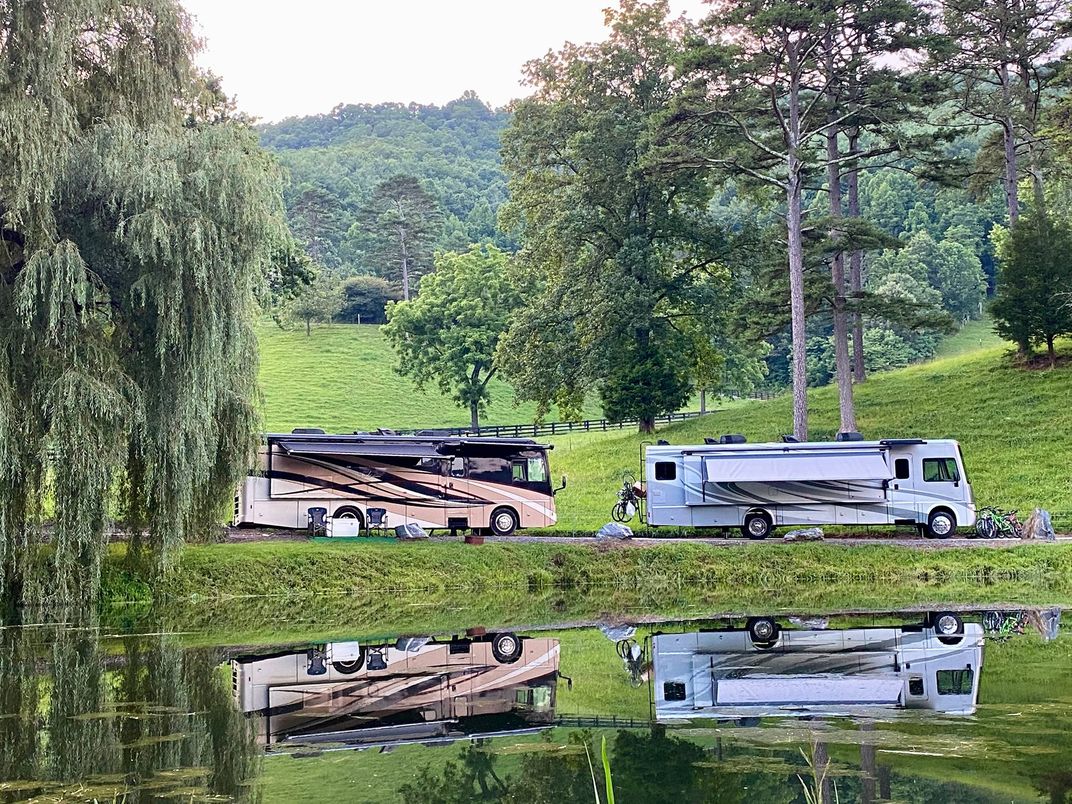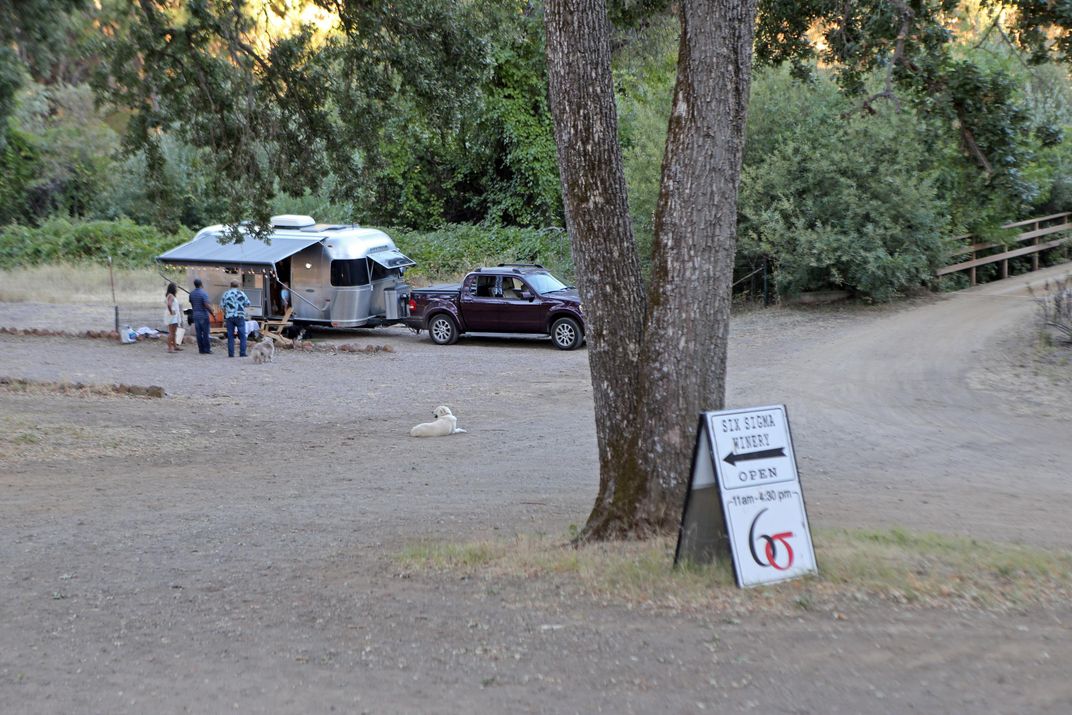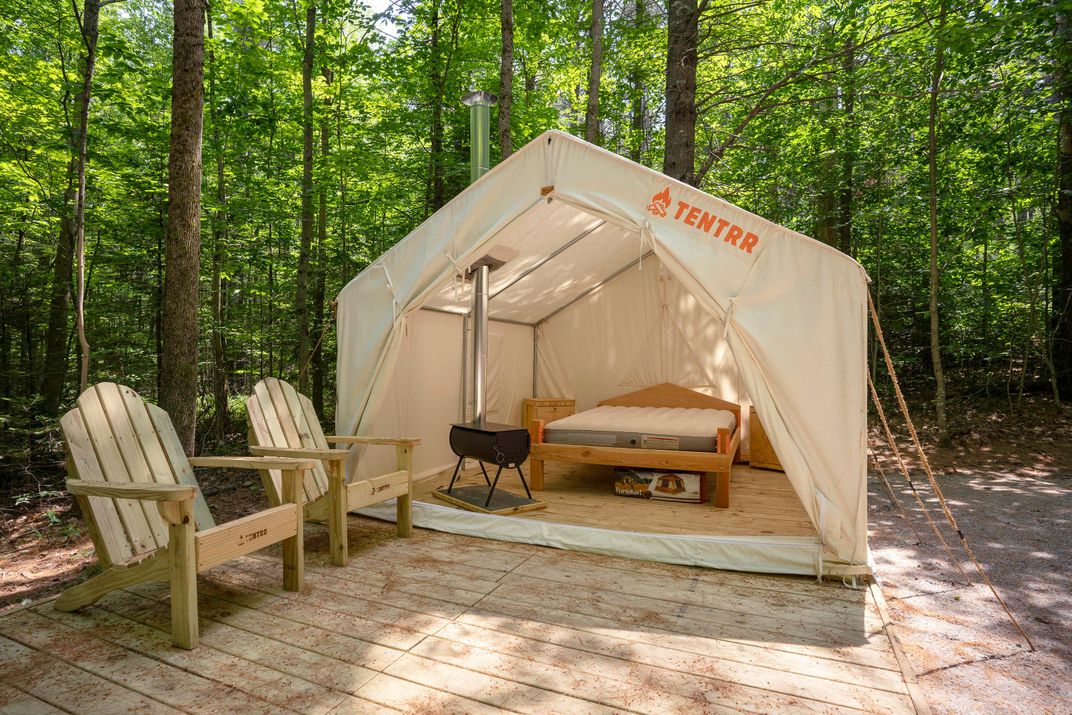Taking a Road Trip During the Pandemic? Consider Camping (Legally) on Private Land
These five sites will help you find the perfect spot to avoid the summer crowds
/https://tf-cmsv2-smithsonianmag-media.s3.amazonaws.com/filer/e3/1a/e31af204-920e-4a3b-8656-5e0465be3be1/summer_camping-main.jpg)
Over the last three years, full-time RVer Robin Barrett has slept on the grounds of a miniature train museum in Oregon, beside the sprawling vineyards of a Colorado winery and at a lavender farm in Washington state. The author of Be a Nomad, Change Your Life, a guide to mobile living, is constantly seeking out new and interesting spots to park herself for the night.
“I look for places that provide me with much more of a local sense than if I'm simply staying at a truck stop or RV park,” Barrett says, “and are typically not more than a half-hour off the route toward my end destination. I didn't know there were so many great options out there—but honestly, there are a ton.”
Barrett is just one of the thousands of RVers that have fallen in love with boondocking, or “dry camping,” a term that generally refers to RV or van camping without access to services like electrical hookups or external water facilities. While this includes bedding down beneath the stars in federally run forests, alongside public beaches, and even in the parking lot of a Walmart or Cracker Barrel (both which typically allow overnight stays), a growing number of private lands are opening themselves up to boondocking, and in many cases, tent camping as well. During the COVID-19 pandemic, such sites have become particularly enticing across the U.S., as many travelers shy away from staying in hotels and RV rentals reach new heights nationwide. In fact, the peer-to-peer motorhome rental marketplace Outdoorsy.com is now “up to a booking a minute in the U.S.,” according to its co-founder and CEO Jeff Cavins, via email.

“People are looking for safe ways that they can still leave home during COVID,” says Marianne Edwards, co-founder of BoondockersWelcome.com, a Canadian-based membership site connecting RVers with places to park for free on private property, including a host’s own driveway or somewhere in their yard. “RVing is one of them,” she says, “and our site helps them fill in the gaps of getting to a destination [for example, on a multi-day trip from Chicago to California] without having to spend $40 to $50 a night at RV parks or campgrounds along the way.”
However, these properties often offer so much more than a simple place to park your vehicle. “Many of the hosts like to interact with their guests,” says Edwards, “though it’s definitely not a requirement. Still, it’s great for travelers who might want tips of lesser-known places and hidden gems in the area from the people who live there.”
HarvestHosts.com provides a similar membership-based service for RVers, though instead of private homes, the properties for boondocking include breweries, wineries, working farms and museums. Websites like HipCamp.com list tiny homes, campsites, RV spots and glamping sites located on private lands across the country. Each of these charges per night and not all are considered dry camping sites—in fact, some even have washrooms and provide full electricity—but they do connect private landowners with public use. You might find yourself RVing on a working New Jersey horse ranch one night and tent camping on a Michigan farm the next.
Harvest host Christian Ahlmann co-owns Six Sigma Ranch, a 40,300-acre working ranch and winery in Lower Lake, California, with his family, and they’ve been welcoming HH guests for several years. In the beginning, says Ahlmann, they offered just two spots for RVers: flattened-out gravel stretches large enough to accommodate any size RV out there. Now the property is home to six “official” spaces, as well as an area by the winery for overflow on especially busy nights, which are fairly frequent these days. “A few of the sites are also down by the creek and out by the barn,” Ahlmann says, “because we've realized lots of travelers might prefer overnight spots that are more fun and creative.”

For Ahlmann, being a Harvest Hosts property is a winning endeavor. Although RVers stay for free with their annual HH membership, he says they tend to jump into the ranch’s existing activities, whether that’s partaking in an ATV property tour ($20/person) that Ahlmann often leads himself, or enjoying a flight of wines ($10/person) at shaded and distantly placed picnic tables. Six Sigma is also home to farm animals such as cows, pigs and sheep, as well as a series of hiking and biking trails open for public use during COVID. “We're a bit competitive when it comes to offerings,” Ahlmann says, “and we love spoiling our guests. This helps connect them to the brand, and they often leave with several bottles of our wine in tow and even a subscription to our wine club. We then get nice reviews and other people come, and it’s like a wheel that keeps moving forward.”
Since Harvest Hosts and Boondockers Welcome each allow members to contact hosts directly ahead of time, both parties can decide on comfort levels regarding things like socially distant interactions and proximity to other RV spots on the property prior to meeting. Something else to consider: the RVs themselves. “Most RVs are set up for boondocking for a few nights at a time,” says Edwards, “in that they have a deep-cycle battery which stores energy, so they don’t initially have to be plugged in to run low-usage items like the fridge, lights, etc. They also all have a freshwater tank, so that you can carry enough water to flush your toilet and wash your face.” The point being, you likely won’t be entirely off-the-grid if you don’t want to be.

Still Ahlmann believes these kinds of seemingly primitive experiences can really make a lasting impression, especially among kids. “The more device-dependent we get,” he says, “the more something really authentic, whether it’s meeting some of our sheep or learning about the area’s original settlers on a self-guided hike across the property, can strike a note.”
Barrett agrees. “Who doesn’t want to pull up next to an orchard or wake to find goats grazing outside your door, and then go and purchase some of the cheese that’s been made from their milk? I mean, I can’t believe all the crazy great stuff that’s available [on these sites],” she says.
Find Your Place
Whether it’s sleeping in a teepee in someone’s backyard or RV overnighting next to a brewery known for its blondes and pale ales, these five sites will help you find an ideal spot to set up camp for the night:
HipCamp.com
Choose among hike-in campsites, cozy rustic cabins, luxe glamping-style tents and treehouses, as well as places to park your RV—some that even have potable water and electric hook-ups. Each listing on Hip Camp provides a list of amenities (like whether there’s wifi and/or showers), essentials such as toilets and the campfire allowances, and a brief description of the property itself. Campsites include everything from open fields where grazing llamas reside to a wheat-growing ranch with its own chicken coop, built on the bed of a 1962 Chevy.
HarvestHosts.com
A $79 yearly membership fee to Harvest Hosts gives you access to hundreds of private host properties across the U.S., such as whiskey distilleries, breweries, art museums and golf courses, where you can stop and set up for the night. “What I look for in a Harvest host is that they offer something I’m interested in,” says Barr, “because I absolutely always like to purchase something to show my support.” Things like bottles of merlot, lavender salts and even fresh produce.
Hosts specify the length of rig they can accommodate, how many sites they have available and the length of stays allowed (typically a max of 24 hours but it’s at the host’s discretion). RVs must be fully self-contained, meaning you need your own toilet and a holding tank for waste water.
BoondockersWelcome.com
“Our hosts can be renters or owners,” says Edwards, “but we require that they have control of the property.” This might mean a city parking spot or a farm that has extra space near its field. Like Harvest Hosts, Boondockers Welcome hosts specify the size of RV they can accommodate. While all RVs must also be self-contained, Edwards says that many hosts do provide electric hookups and water, similar to that of an RV park or campsite. The perk, she says, comes from “most of our hosts being RVers themselves.” She adds, “Quite often it’s one of the reasons that they’re hosting in the first place. That, and they like interacting with the guests who are coming through.”
Tentrr.com
Tentrr specializes in camping and glamping experiences on private lands, either with your own tent or at a “Tentrr Signature” campsite, which are fully-equipped with amenities like a canvas tent, mattress and heat (either an individual tent heater or a wood burning stove), as well as an outdoor sun shower, camp toilet and storage containers for both food and water. You may find yourself sleeping next to a river perfect for tubing and kayaking, or tucked amid old-growth redwood trees with a nearby hammock for lounging.
Campendium.com
Along with user-driven reviews of campgrounds and RV parks, Campendium provides listings of free overnight RV parking and tent camping sites from Maine to the Mojave Desert. While these aren’t on private lands, some—such as trailside in Moab, Utah, or along the sands at the Mouth of the Rio Grande River in Texas—feel equally as exclusive. The site also features free overnight spots in national forests, city parks, trust lands and conservation areas nationwide.
/https://tf-cmsv2-smithsonianmag-media.s3.amazonaws.com/accounts/headshot/LauraKiniry.png)
/https://tf-cmsv2-smithsonianmag-media.s3.amazonaws.com/accounts/headshot/LauraKiniry.png)